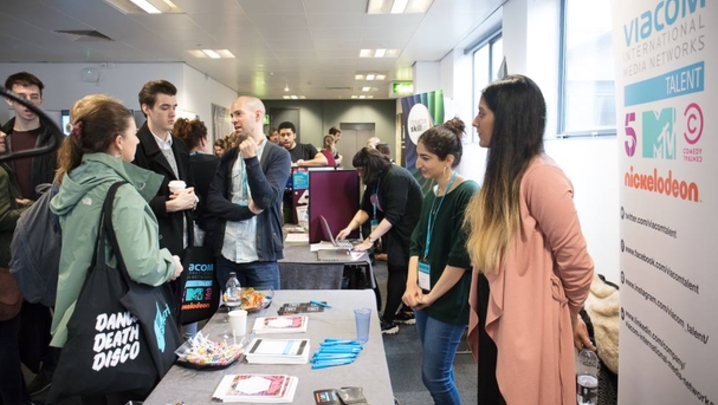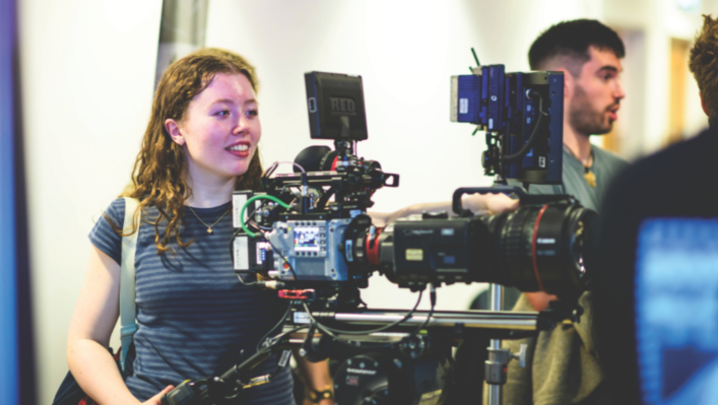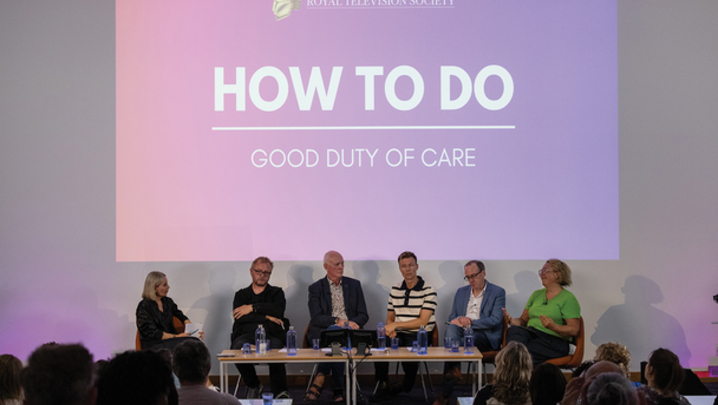Industry pros shared their experience at the UK’s biggest online TV careers fair.
More than 1,600 people attended the RTS Futures Virtual Careers Fair on the first two days of February – making it the most popular Futures event ever.
The talent jamboree featured sessions covering the length and breadth of television – but all were aimed at new entrants to the industry or those in the early stages of their careers.
An online CV clinic and advice area, staffed by leading industry professionals, was attended by 500-plus people, and interactive exhibitor booths allowed companies to talk to attendees via live chat and video.
One of the standout sessions put a spotlight on reality shows. “From the villa to the jungle” featured execs from Lifted Entertainment and ITV Studios discussing how they make Love Island and I’m a Celebrity… Get Me Out of Here!.
Casting is critical, insisted Micky Van Praagh, Lifted’s head of on-screen talent: “We’re only on for three weeks a year, so we want everyone in that camp to be a treat and a surprise…. We have a really broad audience and we have to appeal to every member.”
BBC Radio 1Xtra DJ Snoochie Shy, a contestant on I’m a Celebrity… last year, rated the show “the best thing I’ve ever done…. It challenges you…. I’m never again going to be in a coffin with thousands of maggots crawling over me.”
Tom Gould, Lifted creative director, said the production team is “always looking to reinvent” the show: “There are different types of trial that we always return to, trials involving water, height, critters, endurance, eating and drinking, but, within those categories, we’ll try and come up with new ways to confront the celebrities with their fears.
“We’ve got to be able to surprise the viewers and the campmates, and we’re 21 series in, so it gets harder and harder.”
Another careers fair highlight was the session on a new BBC One sitcom, as yet untitled, which features the dysfunctional Jessop family from pandemic comedy Pandemonium.
The new show’s creator, Tom Basden (a writer on Plebs and actor in After Life), was joined by actor Jim Howick (Sex Education and Ghosts, which he also pens) and producer Tom Jordan.
“Comedy is brutal because you’re asking the audience for a physical reaction of laughter… within minutes, if not seconds, of watching the show,” argued Jordan.
In response to a question on avoiding offence in comedy, Basden said: “There is so much said and written about this but… it’s not that big a deal. You know where the very sensitive areas are and, if you want to write about them, you make sure you do it in a very considered and thoughtful way.”
On Ghosts, said Howick, “we write from a family-friendly angle… but it’s actually not that hard to write comedy and not be offensive.”
Basden added: “I’ve [acted in] three series of After Life and that’s got stuff in it that is definitely more punchy than your average sitcom, but the viewers know the difference between stuff that’s wilfully offensive and things that are provocative.”
Offering advice to aspiring comedy writers and performers, Howick said: “Keep the sitcom simple and allow room for your characters to grow.… From an acting point of view, you need to showcase your talents, whether that be the fringe theatre, which is usually the best place to be signed by an agent [or] nowadays you can use your phone for that [too].”
Basden advised writers to work on a few scripts at a time: “All the writers I know have been turned down far more than they’ve been commissioned… it’s worth having different plates spinning. Also, you’ll find that your writing improves because you’re not just constantly honing the same script.”
Rachel Lodder, head of early careers talent at Sky, explained how the broadcaster’s new Content Academy works. Launched last year and operating across Sky Studios, News, Sports and Content, the first intake is giving 24 people, both school-leavers and graduates, 12 months’ work.
Lodder said: “Our aspiration is that people in the programme will stay with Sky for the long term, and we’ll look to find permanent homes for [those] who roll off the programme after 12 months.”
A couple of the first intake, both in the school-leaver cohort, Amrit Singh Mann and Matty Turner, discussed their experiences. Mann, who is currently based in Sky News, said: “By the end of this year, I will have had experience in every single department… it’s giving me an intensive, in-depth learning experience.”
Sky is running the Content Academy again this year and Turner advised applicants: “Really put the time in – don’t rush it…. Do your research and understand all about Sky – it’s a massive company.”
Daniell Morrisey, who runs the BBC’s early careers schemes and apprenticeships, hosted a session featuring four new entrants who have benefited from such programmes.
Recent graduate and RTS bursary scholar Charly Humphreys has worked as a production secretary on ITV2 smash hit Love Island and Sky One show Dating No Filter. Discussing the RTS scheme, she emphasised the “confidence” it has given her and the “support, not just from the people who run the scheme but from my peers – I’ve met so many like-minded people”.
Former BBC journalism apprentice Chanise Evans opted for an apprenticeship, rather than university. “I felt that I was not going to come out with any debt and I was going to learn on the job, which was exactly what I needed – practical experience,” she said. Currently, she is a digital journalist at the BBC Young Reporter project, producing content for 11- to 18-year-olds.
The “Getting started in drama” session featured two recent entrants to the industry, Hollyoaks continuity editor Sarah Mclean and ITV Studios development editor Daniel Brown. Mclean described her role as being “responsible for making sure all the little details are correct across the scripts – who’s been sleeping with whom and who knows about it!”.
Script reading is a common route into the drama genre, as it was for Brown. “The amount of stuff that we get sent at ITV Studios is ridiculous – every company needs readers,” he revealed.
“Opinions are very important – everyone is very opinionated in drama,” he added, although Mclean cautioned: “It’s important to be tactful with writers. They say they want constructive criticism but they also want to know their script is wonderful.”
Andy Hope teaches the diploma in camera, sound and vision mixing at the National Film and Television School. He explained how the school prepares students for work in a TV studio, whether in the gallery as a vision or sound mixer or lighting director, or on the studio floor as a camera or sound operator.
Jude Winstanley, a TV line producer and MD of theunitlist.com, ran a couple of informative sessions. The first offered a guide to entry-level roles and getting started in the industry; the second was aimed at TV’s vast army of freelancers and covered the vital issues of managing finances, remaining resilient between jobs and negotiating pay rates.
“Production management: Have you got what it takes?” opened the lid on this in-demand industry role. Finally, “Have you thought about your transferable skills?” featured Jade Gordon, founder of Creative Train, who explained that TV also values people from outside the industry with the right experience.
Report by Matthew Bell. The RTS Futures Virtual Careers Fair was held on 1 and 2 February. It was sponsored by the National Film and Television School and IMG Studios. The sessions can be watched at: https://rts.org.uk/video/careersfair22






